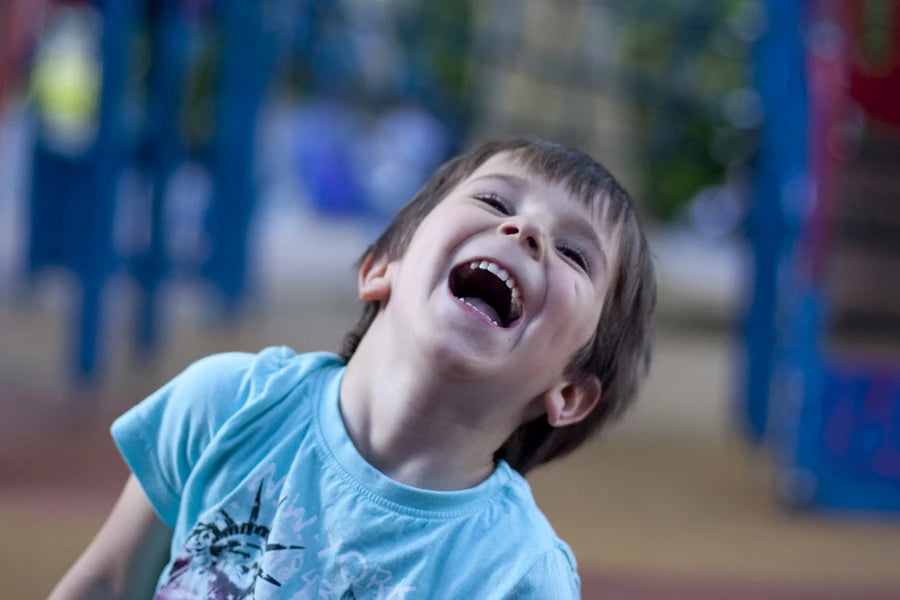
Here's What An Expert Has To Say About Helping A Child With ADHD Thrive Over The Summer
source article: https://littlethings.com/family-and-parenting/adhd-thrive-summer
Over 6 million children between the ages of 3 and 17 have been diagnosed with ADHD, according to Centers for Disease Control and Prevention, with 2.4 million of them between the ages of 6 and 11. That’s a lot of families that need to make extra preparations for their kids during the summer months. Parents of a child with ADHD can help their child thrive this summer by anticipating challenges, easing into the transition, and setting a schedule. LittleThings spoke with Colleen O’Grady, MA, LPC, author of Dial Down the Drama and Dial Up the Dream for tips.
“Transitions are hard for kids with ADHD,” says O’Grady. “The transition from school to summer is difficult because there is a lack of structure. The structure is still needed even if your kids are not in the classroom and there are no assignments to be done. Some of the issues that can arise are kids becoming obstinate when asked to do simple chores like loading the dishwasher. Kids and teens with ADHD can hyperfocus on gaming, social media, and TV all day long. And when you tell them to get off the screens, they can go ballistic. Without structure, they can lack the motivation to do anything.”
The older your child, the more issues you might encounter. “Without structure, the ADHD teen can stay up later and later till they get their night and days mixed up,” says O’Grady. “Also, because of their impulsivity, they can binge on junk food and sugar. These issues do not make for a relaxing summer for parents. They can cause drama in the home. Parents can find themselves in a constant battle over sleep, junk food, screens, messy rooms, attitudes and defiance.”
Viewing things from your child’s point of view may be helpful. “A child or teen with ADHD has difficulty with focus and attention and often forgets things,” says O’Grady. “This is because there are 12 thoughts flying through their brains at the same time, like 12 balls in the air. A routine is a way to bring order to the thoughts and help them become sequential so they can focus on one thing at a time. This helps the child stay on track, making it easier to accomplish daily tasks.”
O’Grady says that discussing schedule changes and keeping track what’s coming on a white board or the refrigerator can also be helpful. She also suggests that parents, “keep repeating the conversation and asking them how they can prepare and remember.”
Another tip O’Grady shares is about the balance activities with downtime. “The gift of summer is being able to slow down the pace of the busy school year. So, let’s say the school year pace is at a 10 for being busy, and you want to slow down the pace to at least to 7. But you don’t want to go from 10 to 0. You want to have some space in the routine, some downtime. The unfortunate thing is that today, downtime has become synonymous for screens. I would suggest that only part of downtime is screens, and the other part of downtime is doing anything else in the real world. And yes, your ADHD kid will complain, but if they get bored enough they just might pick up the dusty guitar in the corner of the room.”
“If your child is in middle school or younger, summer camps are a great way to go,” says O’Grady. “They are great for ADHD kids because they are structured, they have a routine, and they are active. Many kids who have ADHD have hyperactivity, so camps provide outside outlets for adventure and lots of movement.”
Besides camps, there are many other things you can do based on your child’s interest.
“They can join a swim team and get daily swimming lessons,” says O’Grady. “If they love sports, you can get them in golf lessons, basketball workshops, or soccer workshops. They can take cooking lessons or art classes. Summer may be a good time to improve a skill or learn something new, like playing an instrument like drums or bass.”
5 Responses
شركات نقل العفش بمكة
https://fullservicelavoro.jimdosite.com/
http://treeads.nation2.com/
https://jumperads.yolasite.com/
http://jumperads.nation2.com/
http://transferefurniture.hatenablog.com
https://atar-almadinah.weebly.com/
https://allmoversinriyadh.wordpress.com/
https://allmoversinriyadh.wordpress.com/2022/04/09/%d8%b4%d8%b1%d9%83%d8%a9-%d8%aa%d9%86%d8%b8%d9%8a%d9%81-%d8%a8%d8%a7%d9%84%d8%b1%d9%8a%d8%a7%d8%b6-%d9%85%d8%ac%d8%b1%d8%a8%d8%a9/
https://allmoversinriyadh.wordpress.com/2022/04/07/%d8%a7%d9%81%d8%b6%d9%84-%d8%b4%d8%b1%d9%83%d8%a9-%d8%aa%d9%86%d8%b8%d9%8a%d9%81-%d8%a8%d8%a7%d9%84%d8%b1%d9%8a%d8%a7%d8%b6/
https://allmoversinriyadh.wordpress.com/2022/05/13/%d8%b4%d8%b1%d9%83%d8%a9-%d9%86%d9%82%d9%84-%d8%b9%d9%81%d8%b4-%d9%88%d8%ba%d8%b1%d9%81-%d8%a7%d9%84%d9%86%d9%88%d9%85-%d8%a8%d8%a7%d9%84%d8%b1%d9%8a%d8%a7%d8%b6/
https://companymoversinjeddah.wordpress.com/
https://moversfurniture2018.wordpress.com/2018/12/30/%D8%A7%D9%87%D9%85-%D9%85%D9%83%D8%A7%D8%AA%D8%A8-%D9%88%D9%85%D8%A4%D8%B3%D8%B3%D8%A7%D8%AA-%D8%B4%D8%B1%D9%83%D8%A7%D8%AA-%D9%86%D9%82%D9%84-%D8%B9%D9%81%D8%B4-%D8%A8%D8%AC%D8%A7%D8%B2%D8%A7%D9%86/
https://moversriyadhcom.wordpress.com/
https://moversmedina.wordpress.com/
https://moversfurniture2018.wordpress.com/
https://moversmecca.wordpress.com/
https://khairyayman74.wordpress.com/
https://companymoversmecca.home.blog/
https://companymoverstaif.home.blog/
https://companymoverskhamismushit.home.blog/
https://whitear.home.blog/
https://companyhouseservice.wordpress.com/
http://bestmoversfurniture.wordpress.com/
https://companymoversjeddah.wordpress.com/
https://companycleaning307819260.wordpress.com/
https://companymoversriydah.wordpress.com/
https://ataralmadinah662300791.wordpress.com/
https://groups.google.com/g/moversfurniture/c/wwQFSNvgyAI
https://groups.google.com/g/moversfurniture/c/4L1oHETS4mQ
https://nowewyrazy.uw.edu.pl/profil/khairyayman
https://companyhouseservice.wordpress.com/2022/08/06/%d8%a7%d9%81%d8%b6%d9%84-%d8%b4%d8%b1%d9%83%d8%a9-%d8%aa%d9%86%d8%b8%d9%8a%d9%81-%d8%a8%d8%a7%d9%84%d8%b1%d9%8a%d8%a7%d8%b6/
افضل شركة نقل عفش بينبع
https://disqus.com/by/disqus_d3gjkohn1L/about/
https://www.divephotoguide.com/user/Yanbu/
https://myspace.com/company.in.yanbu
https://letterboxd.com/yanbu11/
https://www.mightycause.com/profile/t8zo2f
https://www.diggerslist.com/680f3e4976f84/about
https://www.ted.com/profiles/49357932
https://lichess.org//Yanb
https://talk.plesk.com/members/yanbu.416335/#abou
https://www.indiegogo.com/individuals/38565807
https://hashnode.com/Company11
https://lichess.org//Yanbu
https://www.mobafire.com/profile/yanbu11-1194053?profilepage
https://myanimelist.net/profile/Yanbu
https://www.noteflight.com/profile/d01b0aa45483c6a4ecfe8cf31fecd8c33c3f22a4
https://www.designspiration.com/leen1362023/saves/
https://spinninrecords.com/profile
https://www.instructables.com/member/Yanbu/?cb=1745873769929
https://scioly.org/forums/memberlist.php?mode=viewprofile&u=157329
https://pastebin.com/u/Yanbu/comments
https://www.gta5-mods.com/users/Yanbu
https://www.divephotoguide.com/user/Yanbu/
https://audiomack.com/yanbu
https://www.magcloud.com/account
https://www.diggerslist.com/680f3e4976f84/about
https://speakerdeck.com/yanbu
https://triberr.com/Company11
https://www.hackerearth.com/leen1362023/
https://mastodon.social/Yanbu
https://www.producthunt.com/company111
https://hub.docker.com/u/yanbu11?gl=1*1wb44oo*_ga*Mzc5ODI2MC4xNzQ2MjY4NzYz*_ga_XJWPQMJYHQ*czE3NDYyNjg3NjIkbzEkZzEkdDE3NDYyNjg5NjckajYkbDAkaDA.
https://www.custommagnums.com/members/yanbu.172085/
https://sketchfab.com/Yanbu
https://www.ezistreet.com/profile/yanbu/about
https://therabbitroom.kindful.com/dashboard
https://www.wonderhowto.com/settings/personal/
https://www.warriorforum.com/members/Yanbu.html?utm_source=internal&utm_medium=user-menu&utmcampaign=user-profile
https://www.behance.net/yanbucompany
https://qiita.com/Yanbu11
https://www.scca.com/account
http://profiles.delphiforums.com/n/pfx/profile.aspx?webtag=dfpprofile000&userId=1891255966
https://app.zintro.com/profile/yanbu?ref=Yanbu
https://www.openstreetmap.org/user/Yanbu%20111
https://app.giveffect.com/users/1601264-company
شركة الصقر الدولي ارخص شركات نقل عفش
https://www.atar-almadinah.com/%D8%B4%D8%B1%D9%83%D8%A9-%D8%AA%D8%AE%D8%B2%D9%8A%D9%86-%D8%B9%D9%81%D8%B4-%D8%A8%D8%A7%D8%A8%D9%87%D8%A7.html
https://www.atar-almadinah.com/%D8%B4%D8%B1%D9%83%D8%A9-%D8%AA%D8%BA%D9%84%D9%8A%D9%81-%D8%A7%D9%84%D8%B9%D9%81%D8%B4-%D8%A8%D8%A7%D8%A8%D9%87%D8%A7.html
https://www.atar-almadinah.com/%D8%B4%D8%B1%D9%83%D8%A9-%D8%AA%D8%BA%D9%84%D9%8A%D9%81-%D8%A7%D8%AB%D8%A7%D8%AB-%D8%A8%D8%A7%D9%84%D8%B1%D9%8A%D8%A7%D8%B6.html
https://www.atar-almadinah.com/%D8%B4%D8%B1%D9%83%D8%A9-%D8%A7%D9%84%D8%B5%D9%81%D8%B1%D8%A7%D8%AA-%D9%84%D9%86%D9%82%D9%84-%D8%A7%D9%84%D8%B9%D9%81%D8%B4-%D8%A8%D8%A7%D9%84%D8%B1%D9%8A%D8%A7%D8%B6.html
https://www.atar-almadinah.com/%D8%B4%D8%B1%D9%83%D8%A9-%D9%86%D9%82%D9%84-%D8%B9%D9%81%D8%B4-%D8%A8%D8%A7%D8%AD%D8%AF-%D8%B1%D9%81%D9%8A%D8%AF%D8%A9.html
https://www.atar-almadinah.com/%D8%A7%D8%B1%D8%AE%D8%B5-%D8%B4%D8%B1%D9%83%D8%A7%D8%AA-%D9%86%D9%82%D9%84-%D8%B9%D9%81%D8%B4-%D8%A8%D9%8A%D9%86-%D8%A7%D9%84%D9%85%D8%AF%D9%86.html
شركة تنظيف فلل بالقطيف
شركة مكافحة حشرات بالقطيف وكذلك شركة كشف تسربات المياه بالقطيف وتنظيف خزانات وتنظيف الموكيت والسجاد والكنب والشقق والمنازل بالقطيف وتنظيف الخزانات بالقطيف وتنظيف المساجد بالقطيف شركة تنظيف بالقطيف تنظيف المسابح بالقطيف
https://jumperads.com/qatif/anti-insects-company-qatif.html شركة مكافحة حشرات بالقطيف
https://jumperads.com/qatif/water-leaks-detection-company-qatif.html شركة كشف تسربات بالقطيف
https://jumperads.com/qatif/qatif-company-surfaces.html شركة عزل اسطح بالقطيف
https://jumperads.com/qatif/qatif-company-sewage.html شركة تسليك مجاري بالقطيف
https://jumperads.com/qatif/qatif-cleaning-company-sofa.html شركة تنظيف كنب بالقطيف
https://jumperads.com/qatif/qatif-cleaning-company-mosques.html شركة تنظيف مساجد بالقطيف
https://jumperads.com/qatif/qatif-cleaning-company-Carpet.html شركة تنظيف سجاد بالقطيف
https://jumperads.com/qatif/qatif-cleaning-company-tanks.html شركة تنظيف خزانات بالقطيف
https://jumperads.com/qatif/qatif-cleaning-company-swimming-bath.html شركة تنظيف وصيانة مسابح بالقطيف
https://jumperads.com/qatif/qatif-cleaning-company-Furniture.html شركة تنظيف الاثاث بالقطيف
https://jumperads.com/qatif/qatif-cleaning-company-home.html شركة تنظيف شقق بالقطيف
https://jumperads.com/qatif/qatif-cleaning-company-Carpets.html شركة تنظيف موكيت بالقطيف
https://jumperads.com/qatif/qatif-cleaning-company.html شركة تنظيف مجالس بالقطيف
https://jumperads.com/qatif/qatif-cleaning-company-house.html شركة تنظيف منازل بالقطيف
https://jumperads.com/qatif/qatif-cleaning-company-curtains.html شركة تنظيف ستائر بالقطيف
https://jumperads.com/qatif/qatif-cleaning-company-Villas.html شركة تنظيف فلل بالقطيف
https://jumperads.com/qatif/qatif-company-tile.html شركة جلي بلاط بالقطيف
Leave a comment
Also in ADHD Natural News

The ADHD Overdiagnosis Epidemic Is a Schooling Problem, Not a Child One




شركات نقل العفش بمكة
August 29, 2025
https://sites.google.com/view/movers-riyadh/
https://sites.google.com/view/movers-riyadh/movers-mecca
https://sites.google.com/view/movers-riyadh/home
https://sites.google.com/view/movers-riyadh/movers-jedaah-elhamdniah
https://sites.google.com/view/movers-riyadh/movers-yanbu
https://sites.google.com/view/movers-riyadh/movers-najran
https://sites.google.com/view/movers-riyadh/movers-Jizan
https://sites.google.com/view/movers-riyadh/jazan
https://sites.google.com/view/movers-riyadh/taif
https://sites.google.com/view/movers-riyadh/moversjeddah
https://sites.google.com/view/movers-riyadh/movers-abha
https://sites.google.com/view/movers-riyadh/movers-elahsa
https://sites.google.com/view/movers-riyadh/movers-elkhobar
https://sites.google.com/view/movers-riyadh/movers-elkharj
https://sites.google.com/view/movers-riyadh/movers-elmadina-elmnowara
https://sites.google.com/view/movers-riyadh/movers-eljubail
https://sites.google.com/view/movers-riyadh/movers-elqassim
https://sites.google.com/view/movers-riyadh/movers-hafrelbatin
https://sites.google.com/view/movers-riyadh/movers-elbaha
https://sites.google.com/view/movers-riyadh/movers-jeddah
https://sites.google.com/view/movers-riyadh/movers-dammam
https://sites.google.com/view/movers-riyadh/movers-taif
https://sites.google.com/view/movers-riyadh/movers-burydah
https://sites.google.com/view/movers-riyadh/movers-tabuk
https://sites.google.com/view/movers-riyadh/movers-hail
https://sites.google.com/view/movers-riyadh/movers-khamis-mushait
https://sites.google.com/view/movers-riyadh/movers-rabigh
https://sites.google.com/view/movers-riyadh/madina
https://sites.google.com/view/movers-riyadh/mecca
https://sites.google.com/view/movers-riyadh/dammam
https://sites.google.com/view/movers-riyadh/jeddah
https://sites.google.com/view/movers-riyadh/ahsa
https://sites.google.com/view/movers-riyadh/cleaning-mecca